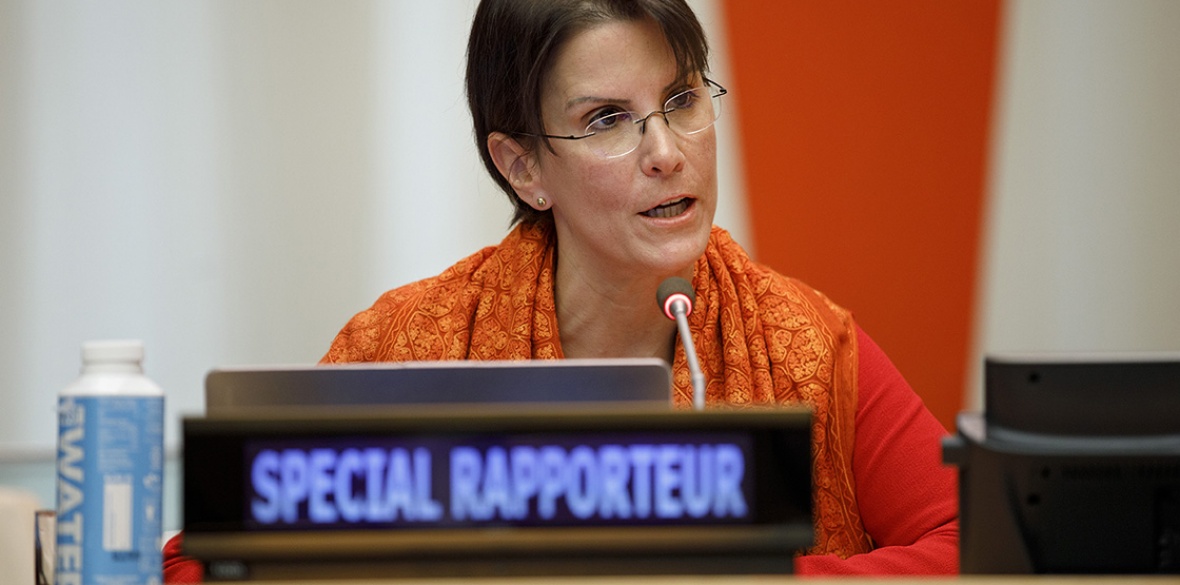This is the last article you can read this month
You can read more article this month
You can read more articles this month
Sorry your limit is up for this month
Reset on:
Please help support the Morning Star by subscribing here
WHEN the latest report by Reem Alsalem, the UN’s special rapporteur on violence against women and girls, landed in May, it sent shockwaves through survivors, support organisations and feminist groups alike.
The report declared that prostitution must be understood as a system of violence involving men and boys who purchase sexual acts, women and girls who are bought to satisfy these acts, and third parties who profit from this exploitation.
It criticised the term “sex work” for masking the severe human rights abuses inherent in prostitution, advocating instead for terms like “victims” and “prostituted women and girls.”
Furthermore, it urged states to adopt an abolitionist framework, which includes decriminalising those in prostitution, providing comprehensive support and exit pathways, criminalising the purchase of sexual acts, and punishing all forms of pimping while educating buyers about the harms of their actions.
It wasn’t the claims themselves that surprised us. In fact, in all 19 pages of the report, there was nothing new to us about the sex industry.
These were truths that we, survivors of prostitution, have been saying and crying out for decades. So why were we so shocked?
We were shocked because, for decades, every body or expert associated with the UN has betrayed us, repeating the false slogan that “sex work is work.”
UN independent expert on sexual orientation and gender identity Victor Madrigal-Borloz stated: “Sex work is work. Yet criminalisation & stigma put sex workers at particular risk of discrimination & violence.”
Similarly, UN special rapporteur on the right to health, Dr Tlaleng Mofokeng, declared: “Sex work is work,” adding: “My wish for 2023 … Full sex work decriminalisation in South Africa!” — which essentially means legalising the actions of pimps.
In 2023, the UN working group on discrimination against women and girls distributed a document using “sex work” as the “term preferred by persons who sell sexual services” and referred to pimps as “managers, organisers and facilitators.”
Additionally, UNAids published a document in 2021 stating that “sex work is consensual sex between adults,” and attributing the significant inequalities faced by sex workers to “punitive laws, policies and practices” rather than the inherent violence by pimps and sex buyers.
These people, working from shiny offices with high salaries, have declared that there’s another job for an inferior category of women that involves the insertion of strangers’ genitals into their bodies. These individuals are tasked with upholding human rights globally, yet they perpetuate harmful narratives that undermine the very essence of those rights.
All these manipulative texts, wrapped like a festering wound in a sterile, sanitised bandage of human rights language, can mislead the layman, but not those who have endured the horrors of the sex industry and devoted their lives to understanding how it really operates.
We know that independent of its legal and social framing, prostitution can never be decent work. No work involves a customer performing acts inside an employee’s body. In no other field is exposure to male violence so extreme and unavoidable. No other field rewards being a minor, inexperienced, or naive or allows work while being tied, drugged, or severely cognitively disabled — conditions all too common in prostitution.
Moreover, the preconditions for non-coerced consent to sex — choosing a partner, the nature of the sexual activity, timing and the freedom to withdraw consent — are absent in prostitution, making it an act of abuse, not a job. Therefore, we reject being rebranded as “sex workers,” a term Reem Alsalem rightfully criticised as “gaslighting victims.”
We know most victims of prostitution want to escape rather than reposition their abusers as “clients” and “managers,” but severe trauma and lack of resources prevent them from doing so.
Pretending that prostitution is just work does not address the inherent violence of the sex industry. How can we effectively tackle this problem?
Sex industry survivors have an answer. We believe that the best alternative for everyone is to avoid entering any form of prostitution (including pornography) under any circumstances.
Involvement in prostitution is destructive and harmful, leaving its victims worse off physically, financially, mentally and socially. Many survivors endure such severe trauma that they never fully recover.
Since the system of prostitution is driven by demand, there is no more beneficial strategy for current victims, potential victims and society than to focus legislative, enforcement and educational efforts on eradicating pimps and sex buyers.
No woman, man, or child — no matter how vulnerable — will be exploited in the sex industry if there are no pimps and no sex buyers. All systems of prostitution should be abolished.
After years of desperate attempts to cry out from under the high windows of shiny buildings, where those who are supposed to protect our human dignity sit, we were privileged to see, for the first time, a report based on our counselling sessions, our documents, and the vast knowledge we gained in the field.
Will Reem Alsalem remain like a Dutch boy with a finger in a leaking dike, trying to block a tsunami of unanimous support for our abusers with her 19-page report, or are we finally witnessing a turn towards humanity in UN-based institutions?
Time will tell. In the meantime, we, as survivors of prostitution, declare that our voices are finally being heard. Don’t go back. Support our demand to abolish all systems of prostitution.
Luba Fein is anti-prostitution lead at feminist charity FiLiA UK (www.filia.org.uk).










